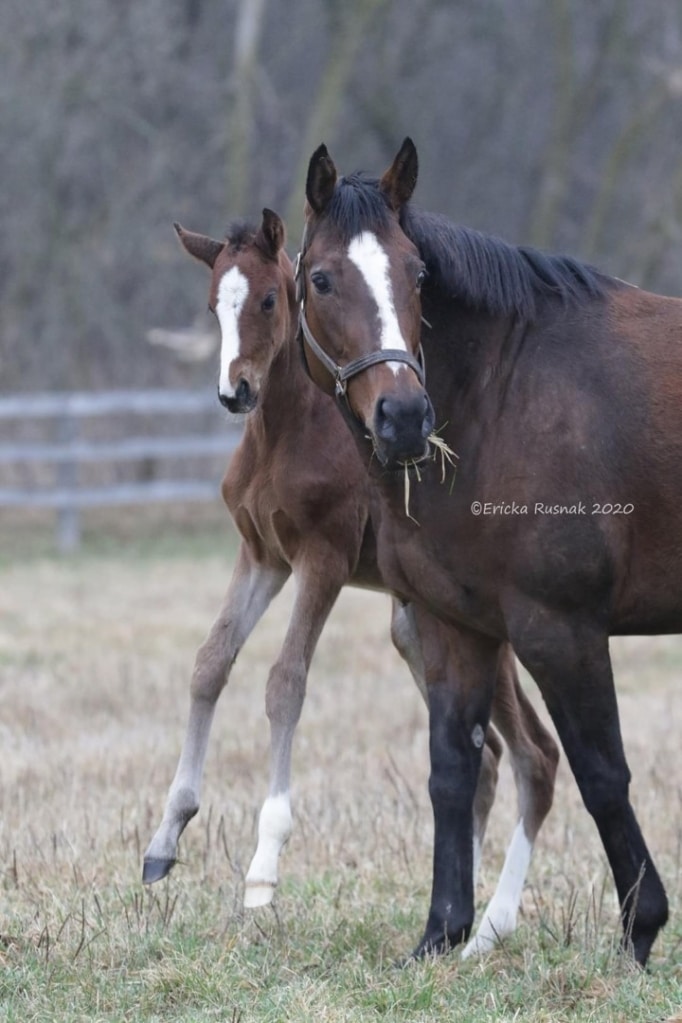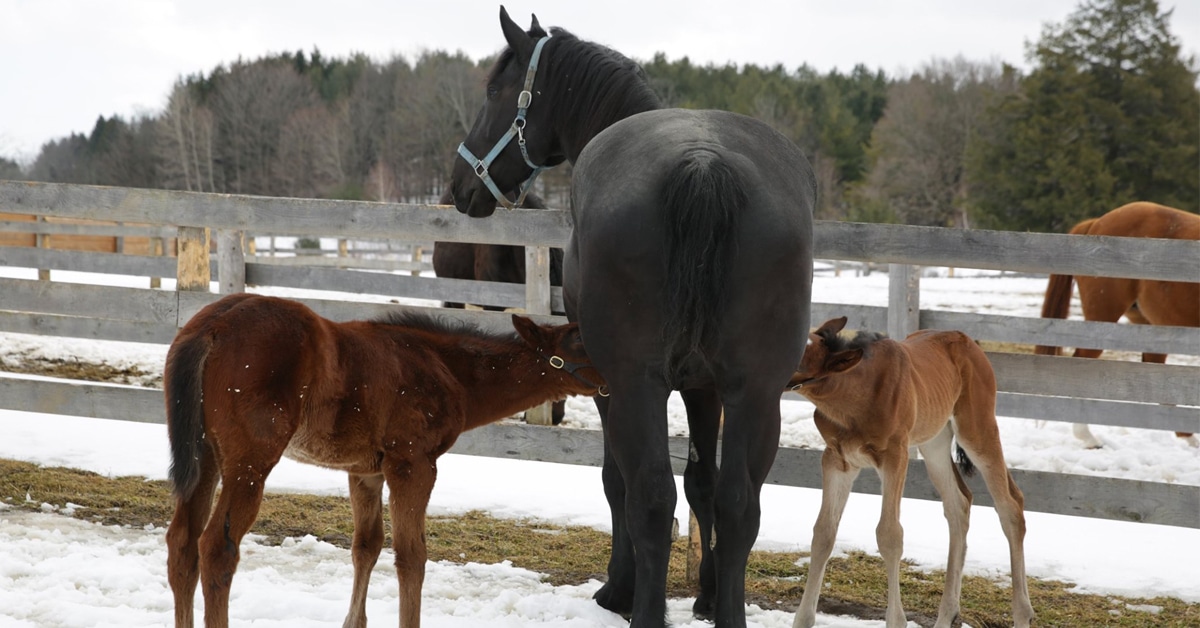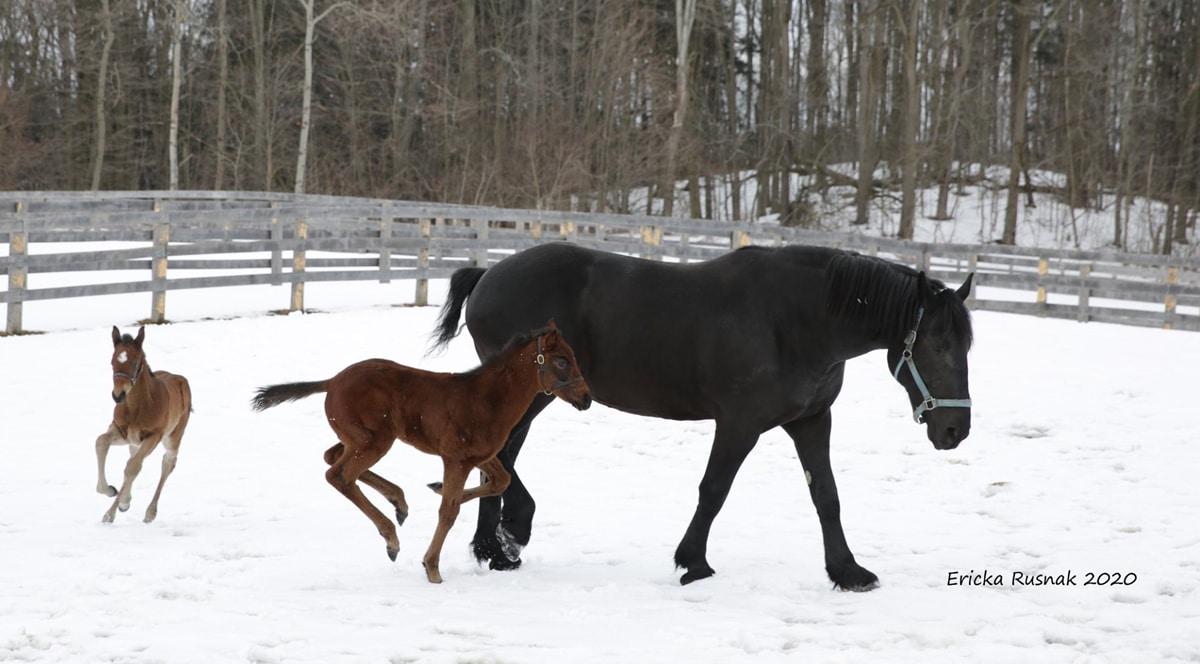While broodmares carry the dreams of bringing forth the next big champion on the racing circuit, unforeseen circumstances such as a mare passing can require a nurse mare to step in.
According to Ericka Rusnak, the general farm manager at Hill ‘n’ Dale which has two farms in Ontario and one in the U.S., in there are several other reasons why nurse mares may be needed.
“For example, if a mare was incapacitated; perhaps she needed to have a caesarian section. In a case like that mare owners would often allow their mare to recuperate without having to worry about raising a foal. Then you would employ the services of nurse mare to step in.
“Some mares will reject their own foal,” she added. “We do have several drugs at our disposal to try to encourage them to reverse that behaviour, and often that will work. But sometimes when it doesn’t, you need a nurse mare.”
Kelly Grieves, thoroughbred manager since 2013 at Bar None Ranches in De Winton, Alberta, says they have used nurse mares “at least six times in the last seven years.” She recalls one particular occasion. “It was a beautiful April day and one of the mares started foaling. It turns out that the foal had cut her uterus and she started to bleed out, so she ended up getting put down. Right after she foaled, another mare [former racehorse Ruby Mist] came up and started licking it. She just loved being a mom, but pregnancy was hard on her. She adopted this one in the paddock; it was crazy.”
Glenn Todd, an owner, breeder, trainer, promoter and teletheatre owner in British Columbia, says, “The only time I’ve ever had to have a nurse mare, it worked out really well and the horse went on to be a very good racehorse, actually. It was a big warmblood mare that had a foal die, and I just had a mare die foaling. The nurse mare was absolutely perfect. The foal grew to be huge.”
An Urgent Need
The need for nurse mares really depends on the year. “We’ve had perfect seasons where there has been no loss of life. Actually, last year was one of those years, so no nurse mare was needed,” explains Rusnak. “This has been a hellish year, and you know it’s not uncommon for that to happen ‒ where you have a great year everything goes according to plan, and then another year nothing seems to go right and it’s not like there is any reason for it. We do have staff monitoring the horses 24 hours a day. We are located about an hour-and-a-half away from the University of Guelph and we have vets very close to the farm, so we are on top of issues when they present and can get them carried off to the OVC really quickly.”

Nurse mare Addy with orphan foal Ace.
When a broodmare does pass, or is simply unable to tend to her foal, a suitable nurse mare must be found immediately. Sourcing a nurse mare is stressful, especially when a newborn foal is waiting in the wings to be fed. Rusnak, and other breeding farms across the country, rely on a close network of people as well as social media when a nurse mare is needed on the farm.
“We have a few contacts that we always try to reach out to, like some people who have draft mares and will lease them out. We will specifically try and reach out to those contacts first and there’s a lovely group on Facebook called Nurse Mares Ontario. It’s a great social network just to reach out to, because sometimes small breeders will have just lost their own foal and they see someone else is looking and are willing to allow their mare to go out and foster someone else’s foal.”
Similar groups can be found at:
Canada Nurse Mares/Orphan Foals
Nurse Mares Or Foals Needed In Alberta, BC and Sask
Standardbred Canada Nurse Mare Program
Crucial Colostrum
Sometimes it is necessary to source colostrum as well as find a suitable nurse mare. This “liquid gold” produced by the mare for the first 24 to 48 hours after parturition is full of antibodies that will help protect the foal’s immune system.
“We always have vets examine the foal, usually within the first 12 hours of life, and have them pull blood ‒ it’s called an IgG test ‒ to make sure there was a positive transfer of the antibodies from the mare’s colostrum to the foal,” says Rusnak. “In case there was a failure of passive transfer, those foals need plasma and they get that from donor horses. They sedate the foal, often but not always, and it’s given intravenously. It is important that they get it because foals will deteriorate fairly quickly and can succumb to infections very quickly. They are really so fragile.”
Leasing a Nurse Mare
Nurse mares do come at a price. “It’s around $3,500 plus HST for the year ‒ which usually starts when they get the mare until they wean the foal,” explains Percheron breeder Robert Black of Ryan Day Farm in Hillsburgh, Ontario. “That is really at their discretion; it’s a management thing on their side when they want to wean the foal. The only thing we ask is that they feed the mare really well.”
Eli Ebersol of First Start Acres Percherons has also leased out nurse mares for the last seven years, and acknowledges that leasing sometimes involves more than just the rate. “For example, if the mare is not in foal when she leaves, then it’s their responsibility to get the mare in foal. We would ship the semen to them and they would take care of getting the mare in foal for us.”
In terms of the weaning process, Rusnak acknowledges that it may differ slightly for one breeder to another. “My own personal preference, I prefer not to wean until the foal is around six months of age, but that varies, I would say between four and seven months.”
Nurse Mare vs. Hand-Rearing
The stress of finding a nurse mare is one thing. Then there’s the additional worry of whether the nurse mare will actually accept the orphan foal.
“Introducing a nurse mare is also super-stressful. Chances are you’ve already lost your mare and you’re dealing with a hungry and stressed-out foal. You are probably bordering on exhaustion and you don’t know what you are going to get when the nurse mares arrives. Is she going to be kind? Is she going to be well-handled? Will she be difficult and skittish? Will she accept the foal with minimal to no resistance, or are you going to have to set up camp and monitor for a lengthy period of time?” asks Rusnak.
Socialization is a key aspect of foal development and is another reason to choose a nurse mare over hand-rearing. Rusnak isn’t keen on the latter for several important reasons.
“My personal preference ‒ and I would say that is pretty uniform in the industry ‒ would be to find a nurse mare. It’s very stressful to try and hand-rear a foal just because they need so much care for the first few months. You’re having to see them through the night. You can obviously bucket raise, but the socialization is lacking, unless you get a nanny goat or maybe an old pony as a companion. Personally I would prefer a mare, as we want to see our Thoroughbreds turned out in nice big fields and I don’t know how that would work with a goat.”
Rusnak also notes that maternal rearing is also critical to their development. “They just don’t learn boundaries the same way they would with a mare raising them.”
A Special Two-fer
This spring at Hill ‘n’ Dale, one paddock contains a mare tending to not one, but two foals. The seven-year-old Percheron named Kelsey Lynn is owned by Robert Black and was called upon when a broodmare at the farm passed away.
“In this particular case, the first mare was taken to OVC (Ontario Veterinary College) and she did not make it. We were able to find a Percheron nurse mare for her. They are so docile. They really make the best nurse mares. She didn’t hesitate at all when she accepted this foal,” said Rusnak.
Not long after Kelsey Lynn had accepted the first foal, another mare on the farm passed. Once again, Kelsey was called upon.
“This Percheron mare had an overabundance of milk, so we thought we would just try and allow her to nurse off this nurse mare until we were able to figure out what to do. Well, it just ended up working out so perfectly. This nurse mare didn’t hesitate, she’s like ‘oh yeah, let me accept this foal as well.’ It all went so smoothly that we opted to keep them together.”
Rusnak concludes, “When someone is celebrating a win as an owner or a breeder, there are so many hurdles that one has to overcome to get there. Just for the foal to be born alive is a hurdle in itself. Surviving weaning, surviving their yearling year and then surviving what we know can happen at the racetrack. It truly is a miracle in itself when they make it to the races, and then win.”



